#spanish vocabulary
Text
Emotions (Spanish)
love = amor
worried = preocupado
angry = enojado
sad = triste
embarassed = avergonzada
afraid = asustado
kind = tipo
happy = feliz
amazed = asombrado
delighted = encantado
bored = perforado
tired = cansado
sensitive = doloroso
hate = odio
#langblr#spanish#spanish langblr#spanish vocab#spanish vocabulary#spanish emotions#emotions vocab#learning languages#learning spanish#spanish learning#studyblr#notes#flashcards#spanish flashcards#spanish studyblr#vocab#vocabulary#spanish words#language#spanish language#learn spanish
374 notes
·
View notes
Note
Just discovered while talking to someone in Spanish that "Adiós" is more of a permanent goodbye, something you might say to someone you expect to never meet again, like a stranger. Instead, he said I should use "nos vemos" when speaking with people I know, which makes sense. I was wondering what other goodbyes I could use that aren't permanent? Obviously there's "hasta luego" and "hasta mañana."
I wouldn't go that far necessarily, but yes adiós can be used for people you don't expect to see for a long time (possibly never again like sayonara means in Japanese)
Literally, adiós is "go with God" which would have been a lot more impactful in the time of needing to journey days/weeks/months to meet some relatives, and possibly having to deal with war, disease, wild animals etc
A lot of Western langauges have something similar, even "goodbye" is "God be with you/ye"
Some people do use it for a permanent goodbye. Others use it for an indefinite but probably long period of goodbye
And some people just say adiós as a standard goodbye with no deeper meaning other than "bye"
Note: You can also say adiosito which I wouldn't necessarily recommend outside of friendly conversation since it can sound sarcastic; it's like "toodle-oo" but it's literally a little goodbye
Note 2: If you vehemently hate someone and you hope to never see them again, you can say hasta nunca which is like "see you never" and I think that's beautiful
-
Today people do use adiós just as "goodbye" though it can read as "we won't see each other for a while"
The more short-term is nos vemos "we will see each other"
Another variation is a direct object version rather than reflexive. You can say te veo pronto "I'll see you soon" for example, instead of nos vemos pronto "we will see each other soon", that sort of thing
-
There's also hasta pronto "see you soon", hasta la próxima "see you next time"
And a lot of people have adapted certain words into Spanish like bye/bai or chau/chao for goodbyes
chau/chao in particular comes from ciao and is super common especially in South America
Another common one I say is cuídate "take care of yourself" / cuídese for polite, cuídense for plural
Depending on context you can also say ¡Suerte! "Good luck!" (or ¡Buena suerte! or ¡Que tengas mucha suerte! "Hope you have lots of luck" or te deseo mucha suerte etc)....
Another common one I say is ¡Ánimo! which means something like "Chin up!" but literally it's "energy" or "cheer"; if you're saying ánimo with someone you're essentially saying ¡Aguanta! or ¡Resiste! which is like "Hang in there!" or trying to pep someone up, where animar is "to cheer someone on" so it's all related there
-
Also I know you said spoken but just in case, if you're signing off on a letter/email there are some basic phrases you can use:
saludos = (a generic kind of goodbye) [lit. "salutations" or "regards"]
un cordial saludo = (something like "kind regards")
atentamente = "yours truly" / "sincerely" [lit. "attentively"]
estamos en contacto / estaremos en contacto = "we'll be in touch"
And if you're writing a friendly letter you can say abrazos or besos for "hugs" and "kisses" respectively; it's very common to say something like te mando un abrazo "I'm sending you a hug" or something like that
-
Also, if you're at a party or something, you can say something like ya me voy or me largo or something like "I'm heading out"
I tend to say something like hora de irme "time for me to go" because in my English-speaking brain saying me largo feels awkward like I'm storming out but I know that's not what that always means
Additionally you can say debo irme "I should go", something along those lines is pretty standard
-
If you're being funny, I think me piro vampiro is somewhat used in Spain (but maybe not so much now)... it's just there for the rhyme. Literally "I'm out, vampire" or "I'm leaving, vampire" [pirarse is an idiomatic way of saying "to leave"]
For Latin America, more common would be chao/chau pescao which is literally "goodbye seafood/fish" since pescao is an informal spelling of pescado where the D can kind of be aspirated
You may also see/hear chao/chau bacalao "goodbye cod"
Again, all for the rhyme. The equivalent of "see you later alligator" in English. Everyone loves a rhyme
But obviously only do this among friends because it's informal and a bit childish
#followers?#learn spanish#spanish#spanish vocabulary#langblr#language#languages#spanish language#long post
382 notes
·
View notes
Text
Vocabulario de los postres 🍦

El pastel, la torta - cake
El bizcocho - spongecake
La torta, el pay - pie
La magdalena - cupcake
El flan - flan
La magdalena, el pastelito, el cupcake - cupcake
La esponjita, el bombón (mex.) - marshmallow
El helado - ice cream
La paleta de hielo - popsicle
El bastón de caramelo - candy cane
El chicle - gum
La galleta - cookie
El batido, La malteada (LatAm.), el licuado (LatAm.) - milkshake
La paleta (LatAm.), el piruela (Spain) - lollipop
La gominola - gummy candy
La rosquilla, el dónut, la dona (LatAm.) - donut
Sabores/tipos - flavors/types
de chocolate - chocolate
de pecana - pecan
de fresa - strawberry
de vainilla - vanilla
de limón - lemon
de queso - cheese
de manzana - apple
de calabaza - pumpkin
#langblr#language#learn languages#spanish#study#learn spanish#spanish langblr#spanish vocab#spanish vocabulary#language learning#spanish language#studying#foreign languages#languages#linguistics#vocabulario#idiomas
362 notes
·
View notes
Text
¡Los expletivos/insultos*!

Carajo — Shit/Goddamn it/Fuck; also a way to intensify regular sentences
“Dónde carajo está mi celular?” — “Where the fuck is my phone?”
Chucha (de tu) madre — Shit/Goddamn it/Fuck
¿Qué chucha? — What the fuck?
Cojudo — Stupid person
Quiero (culear/cachar) tu madre — I want to fuck your mom
Necesitas ser castrad(o/a) — You need to be castrated
Traga leche — Cum swallower
*I’m pretty focused on learning South American (particularly Peruvian/Ecuadorian) vocabulary, so this list does not include Caribbean, Central American, or Peninsular Spanish
#Spanish#spanish vocab#spanish phrases#learning spanish#spanish language#spanish vocabulary#vocabulary#vocab#langblr#spanish langblr#bad words#spanish curses#curses#spanish swears#swears
197 notes
·
View notes
Text
Food vocab - czech, spanish, english
(langblr reactivation challenge day 4)
czech - spanish - english
brambory - patatas - potatoes
brokolice - brócoli - broccoli
celer - apio - celery
cibule - cebolla - onion
česnek - ajo - garlic
čočka - lentejas - lentils
fazole - frijoles - beans
houba - seta - mushroom
hrášek - guisantes - peas
chřest - espárragos - asparagus
kapusta - repollo - cabbage
kukuřice - maíz - corn
květák - coliflor - cauliflower
lilek, baklažán - berenjena - eggplant
mrkev - zanahoria - carrot
okurka - pepino - cucumber
paprika - pimiento - bell pepper
petržel - perejil - parsley
pórek - puerro - leek
špenát - espinaca - spinach
ananas - piña - pineapple
banán - plátano - banana
švestka - ciruela - plum
meruňka - albaricoque - apricot
broskev - melocotón - peach
citron - limón - lemon
hrozny - uvas - grapes
jahoda - fresa - strawberry
borůvka - arándano - blueberry
malina - frambuesa - raspberry
ostružina - mora - blackberry
rybíz - grosella - currant
vodní meloun - sandía - watermelon
meloun - melón - melon
pomeranč - naranja - orange
mandarinka - mandarina - mandarin
třešeň - cereza - cherry
mléko - leche - milk
sýr - queso - cheese
smetana - nata - cream
šlehačka - nata montada - whipped cream
jogurt - yogur - yogurt
máslo - mantequilla - butter
mouka - harina - flour
med - miel - honey
rýže - arroz - rice
těstoviny - pasta - pasta
olej - aceite - oil
ocet - vinagre - vinegar
hořčice - mostaza - mustard
#vocab list#vocab lists#spanish vocabulary#spanish#czech vocab#czech vocabulary#czech#spanish vocab#spanish langblr#czech langblr#food vocabulary#food vocab#langblr#learn czech#learn spanish#learning czech#learning spanish
285 notes
·
View notes
Text
Donde esta algo?
cerca de el lugar - near to the place
al lado de - beside
lejos de el lugar - far from the place
debajo - under
en - on
encima - on
arriba -above
a la derecha - to the right
a la izquierda - to the left
buscar - look for
ver - see
41 notes
·
View notes
Text
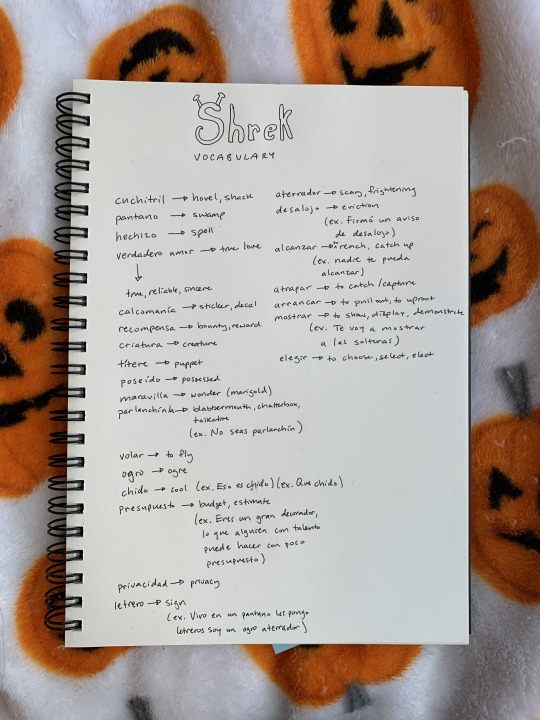
I started a "Spanish" notebook where I put my class notes and any other concepts, vocabulary, etc. for myself to review/study. I watched Shrek in Spanish the other day and started this vocabulary list; it's only for the first 30 minutes or so but there are a lot of good words I legitimately think I will use in every day conversation. (I did give up note-taking at some point and just wanted to watch the movie). I don't know why but I'm obsessed with the word "cuchitril" (Donkey uses this word to refer to Shrek's house). Another favorite that comes up a lot throughout the movie is "hechizo" which means "spell". One of the resources our teacher showed us for looking up words is this website/dictionary, Word Reference. It's helpful because it lists various meanings and puts them in sentences, definitely a step up from Google Translate
Spanish summary: Empecé un cuaderno para estudiar palabras en español. Anteayer, ví la película, Shrek, y escribí los palabras nuevas. Bienvenidos a mi pantano.
#shrek#shrek en español#spanish vocabulary#word reference#i wont feel bilingual if i cant talk about shrek#spanish
36 notes
·
View notes
Text
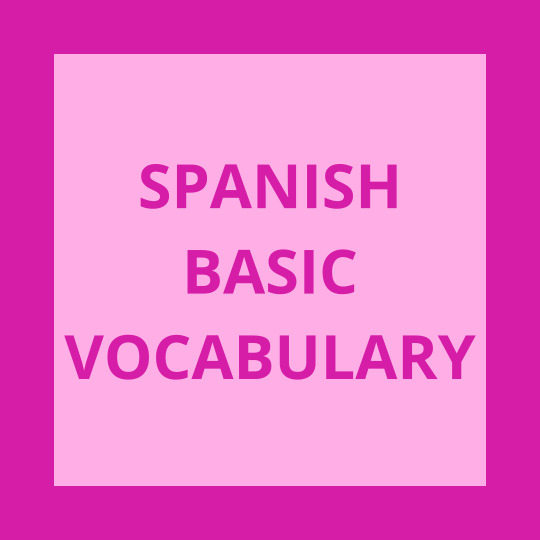

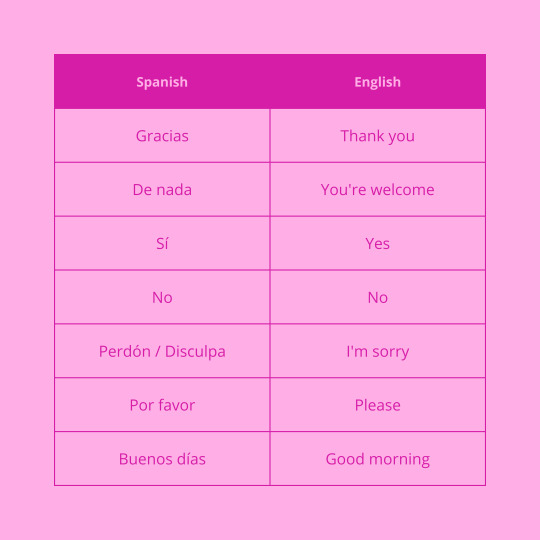
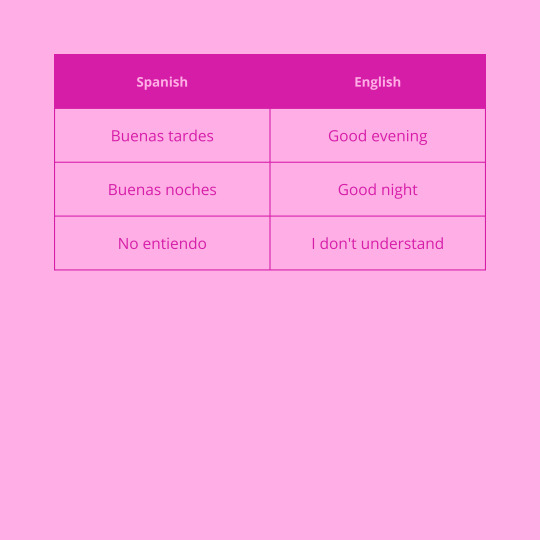
14 notes
·
View notes
Text
Makeup ~ En Español
El Maquillaje - Makeup
La brocha (de maquillaje) - (Makeup) Brush
La esponja (de maquillaje) - (Makeup) Sponge
El lápiz de cejas - Eyebrow pencil
El gel para cejas - Eyebrow gel
La sombra de ojos - Eyeshadow
La paleta de sombra de ojos - Eyeshadow palette
El lápiz de ojos - Eyeliner
El rímel - Mascara
La prebase - Primer
La base - Foundation
El corrector - Concealer
El polvo - Powder
El bronceador - Bronzer
El contorno - Contour
La colorete - Blush
El iluminador - Highlighter
La barra de labios - Lipstick
El brillo de labios - Lipgloss
If I made any mistakes or forget something please let me know :)
#langblr#languages#polyglot#learning languages#language learning#learning spanish#spanish#spanish vocabulary#lingblr#linguistics#vocabulary
13 notes
·
View notes
Text
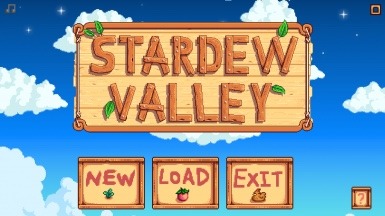
Stardew Valley Spanish Vocabulary
Farm - La granja
Spring - La primavera
Parsnip - La chirivía
Coffee bean - El grano de café
Summer - El verano
Melon - El melón
Blueberry - El arándano
Fall - Otoño
Pumpkin - La calabaza
Grape - La uva
Winter - El invierno
Holly - El acebo
Horse - El caballo
Chicken (Hen) - La gallina
Duck - El pato
Rabbit - El conejo
Cow - La vaca
Goat - La cabra
Sheep - La oveja
Pig - El cerdo
Honey - La miel
Wine - El vino
Cheese - El queso
Cloth - La tela
151 notes
·
View notes
Text
Arriba 8.2 Vocabulary
la farmacia = pharmacy
la perfumería = beauty supply shop
el acondicionador = conditioner
el cepillo de dientes = toothbrush
la colonia = cologne
la crema hidratante = facial cream
la crema de afeitar = shaving cream
el desodorante = deodorant
la pasta de dientes = toothpaste
el perfume = perfume
el talco = talcum power
la joyería = jewelry store
el anillo = ring
los aretes = earrings
la cadena = chain
el collar = necklace
los pendientes = earrings
la pulsera = bracelet
el reloj inteligente = smartwatch
el reloj de pulsera = wristwatch
descripciones = descriptions
de diamantes = diamond
de oro = gold
de perlos = pearl
de plata = silver
más tiendos = more shops
la carnicería = butcher shop
la florería = flower shop
la heladería = ice cream shop
la panadería = bakery
la papelería = stationary shop
la pastelería = pastry shop
la quesería = cheese shop
la zapatería = shoe shop
devolver = to return something
gastar = to spend
hacer juego = to match
la nevería = nieve shop
la paletería = paleta shop
la floristería = flower shop
.
Patreon
#studyblr#notes#spanish#spanish langblr#langblr#spanish language#language#languages#spanish studyblr#spanish notes#spanish vocab#vocab#vocabulary#spanish vocabulary#learning spanish#spanish learning#spanish vocab list#spanish vocab notes#spanish vocabulary list#spanish shopping vocabulary#spanish shopping vocab#shopping vocab#shopping vocabulary#romance languages#european languages#language learning#arriba spanish textbook#spanish textbook notes#spanish textbook vocabulary#textbook notes
50 notes
·
View notes
Text
I should also mention that there are certain words that become whole new words if you use a diminutive or augmentative
As an example - la calabaza is "pumpkin" but el calabacín is usually "squash" or "gourd" or "zucchini"
Or there's la caja "box", la cajita "little box", then el cajón which is "drawer" like in a chest or bureau/dresser
You might also find some suffixes have certain implications - like -azo/a can sometimes "a blow with", so la rodilla is "knee" -> el rodillazo "strike with a knee" or "a knee", or el puño "fist" -> el puñetazo "punch". My favorite is la maza "mallet" -> el mazazo "blow with a hammer"
Another I like to use for discussing the suffixes is the base word la calza which can refer to "footwear" or "breeches" [Note: this is related to the older words for hosiery and stockings where it covered your whole lower body]... so you have the augmentative el calzón "underwear", or the diminutive el calcetín "sock"........ And THEN you have the diminutive of the augmentative, los calzoncillos which is normally "briefs"
206 notes
·
View notes
Text

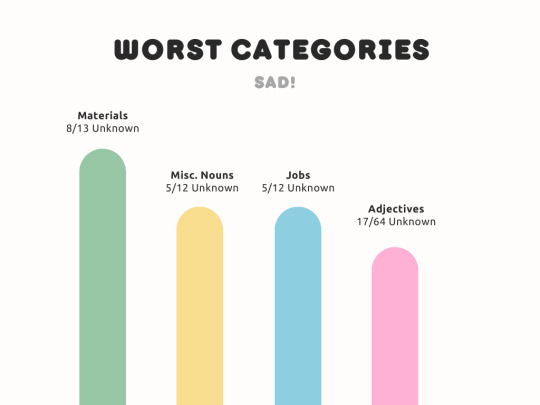
December 14th, 2023
studyblr challenge ⋆。°✩ day 4/30 - a photo of your most recent work
A fun little activity, though admittedly a stretch when it comes to the prompt. I decided to take this list of 625 words to know in your target language and find out how many of them I already knew (without studying them of course) and made a couple graphics of the results. I also included my "unknown" list at the end of this post. Words in bold are completely new, and everything else is vocabulary that I'm cringing at having forgotten I once learned, but could not come up with it at that moment. 60% of the unknown words fit in that latter category. Which means 5 years ago I knew almost 95% of the list. Weirdly both proud for my past self and sad for my now self. Ok I'm done quantifying my language attrition now lol
productivity challenge ⋆。°✩ day 4/100
academics:
✩ bio exam
✩ chem final (chem review 1, 2, 3, 4)
✩ food science exam
✩ food production quiz
spanish: La Lista !
625 94 Words to Know
pig - el cerdo
truck - el camión
tire - la llanta
engine - el motor
bridge - el puente
farm - la granja
ground - el suelo
outer space - el espaso exterior
suit - el traje
stain - la mancha
light/dark blue - azul celeste/marino
crowd - la multitud
priest - el sacerdote
army - el ejercito
soldier - el soldado
manager - el gerente
reporter - el reportero
race (ethnicity) - la raza
murder - asesinato
attack - ataque
magazine - la revista
poison - el veneno
gun - la pistola
race (sports) - la carrera
game (sports) - el partido
sign - la señal
paint - la pintura
ceiling/roof - el techo
lock - la cerradura
needle - la aguja
tool - la herramienta
network - la red
neck - el cuello
beard - la barba
tear (drop) - la lagrima
knee - la rodilla
sweat - el sudor
root - la raíz
wave - la ola
island - la isla
hill - la colina
wood - la madera
stone - la piedra
diamond - el diamante
clay -la arcilla
dust - el polvo
copper - el cobre
silver - la plata
kilogram - el kilogramo
inch - la pulgada
square - el cuadrado
edge - el borde
dot - el punto
sound - el sonido
hole - el agujero
pattern (order/system) - el patrón
pattern (design on fabric) - el estampado
noun - el sustantivo
bottom - el fondo
back (of chair/paper/rear part)- el respaldo/el dorso/el fondo
down - abajo
season - la estación
to shoot (a gun) - disparar
to smell - oler
to bend - doblar
to feed - alimentar
to hang - colgar
to shake - agitar
to signal - señalar
to beat - batir
to lift - levantar
wide/narrow - acho/estrecho
warm/cool - calido/fresco
wet - mojado
deaf- sordo
flat/curved - plano/curvo
tight/loose - apretado/suelto
shallow - poco profundo
weak - débil
light (weight) - ligero
light/dark - claro/oscuro
🎧 The Wheel - SOHN
#langblr#studyblr#studyspo#rambles#spanish vocabulary#long post sorry#my post mine all mine#studyblrchallengehayley#100 days of productivity
14 notes
·
View notes
Text
Español dominicano 🇩🇴 | Dominican Spanish 🇩🇴

I'm studying Mexican Spanish but Dominican Spanish fascinates me so I'd thought I'd make this list :]
please feel free to send corrections if I got anything wrong
Allantoso/a - someone who talks a lot but does very little; all talk no action
Viejebo/a - older person that wants to dress and act young; "hip with the kids"
Palomo (lit. male pigeon) - guy who's a coward or shy when it comes to flirting
¿Qué lo que? - What's up? *can be abbreviated as klk in text
Tíguere - quick-witted guy, guy with street smarts
Pana - buddy, pal
Yala - okay, alright
En olla - to be broke
Chin - a little, a bit
Jevo/a - guy/girl, boyfriend/girlfriend
Colmado - grocery store, bodega
#langblr#language#learn languages#spanish#study#learning languages#spanish vocabulary#spanish language#spanish langblr#learn spanish#language learning#dominican republic#dominican#dominican spanish#vocab list#vocabulario#vocabulary#vocab#spanish vocab
184 notes
·
View notes
Text
Tener vs Haber
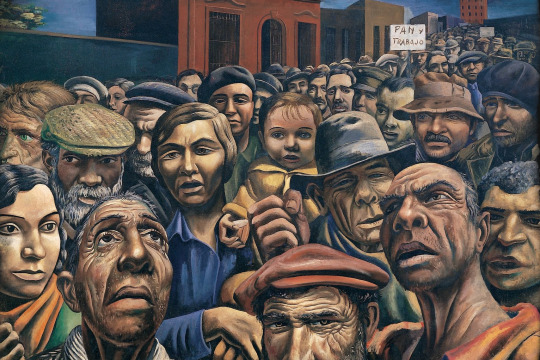
Tener is used to...
To show possession
Tengo los pasaportes en mi bolso.
To talk about appearance
Mi abuela tiene ojos hermosos.
To express age
Yo tengo 25 años.
To show states of being
Yo tengo mucho frío.
To talk about illness
Ella tiene dolor de cabeza.
To express obligation
Rosa tiene que hacer su tarea.
To say “I feel like”
Ana tiene ganas de cenar comida italiana.

Haber is used to...
Express existence (impersonal verb)
Hay muchas bicicletas amarillas en el parque.
Form compound tenses (auxiliary verb)
Ellos ya se han ido.

#vocabulary#learning spanish#verbs#los verbos#español#aprendo español#spanish langblr#langblr#resources#notes#spanish language#spanish vocab#spanish vocabulary#spanish grammar#grammar#spanish rules#spanish phrases
72 notes
·
View notes
Text
Are there any other autistic/ adhd language learners out there with any tips for me?
I’ve been teaching myself Spanish for just over a year - it’s something I’ve always wanted to do. However as an autistic person with social anxiety problems this comes with a set of counterproductive obstacles.
I’d be really interested to hear other neurodivergent language learners experiences and what has worked for them.
#learn spanish#duolingo spanish#spanish vocabulary#learning spanish#neurodivergent#autistic problems#autistic experiences#adhd#autistic adult#first post
10 notes
·
View notes